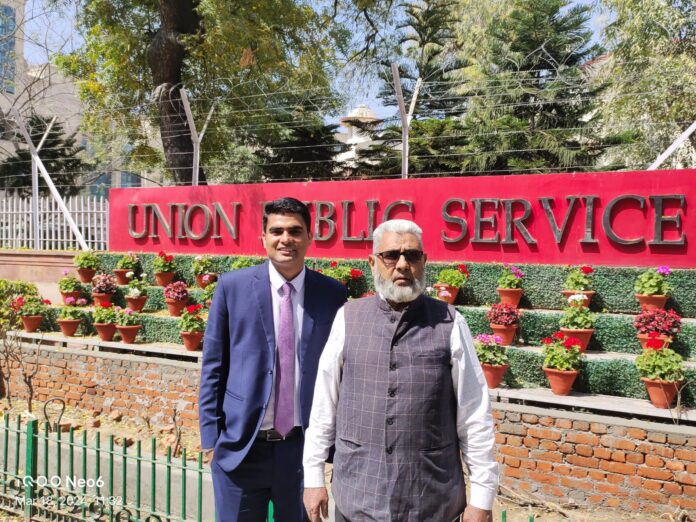Sami Ahmad, TwoCircles.net
Patna: Dr. Wasim Ur Rahman, a medical doctor by training, is among the 26 Muslim candidates who cracked the prestigious Union Public Service Commission (UPSC) this year, securing an impressive All India Rank of 281. It was a tough decision for him to step away from clinical practice, but he had always envisioned serving on a broader platform. And he achieved it in his fourth attempt.
Hailing from the small village of Thikhi in Hathuri Panchayat under Katra Block in Muzaffarpur district, which is famously known as the city of litchis in Bihar, Wasim’s journey reflects a purpose and firm determination.
The 25-year-old is grateful to his encouraging family. His father, Sawood Azam Rahmani, retired as a block agriculture officer in the Bihar government, while his mother served as a head teacher in a government school.
Wasim completed his early schooling up to Grade 8 in Muzaffarpur, first at Hazrat Ali Academy and then at DAV Public School. He was later admitted to Aligarh Muslim University (AMU), where he passed his 10th and 12th with outstanding scores of 90% and 91%, respectively.
Speaking to TwoCircles.net, he shared insights into his motivations and the journey that led him to civil services. “During my clinical postings and internship in my medical college (VMMC & Safdarjung Hospital, New Delhi), I realised that getting into civil administration would provide me a larger platform where I can expand the scope of public services and contribute more effectively to society,” he said.
He admitted that leaving the pursuit of an MD/MS to dedicate himself entirely to civil services preparation was a difficult decision, especially considering the uncertainty and pressure surrounding the examination.
His father initially had concerns but ultimately trusted his son’s resolve. “Wasim was a focused student from the beginning. He is a very calm man. We are thankful to Allah for his success and pray for his further success,” he said.
Their home was soon brimming with well-wishers, celebrating Wasim’s achievement. Today, he is regarded as one of the most eligible bachelors in his extended family.
For his optional subject, he chose anthropology “after considering its practical advantages”.
“The syllabus is concise compared to medical science, and there are adequate resources available for preparation. Since the subject was entirely new to me, I began with familiar areas like human evolution and genetics, which aligned with my medical background. Gradually, I moved to socio-cultural anthropology. Although some concepts were unfamiliar, with the right resources and consistent effort, I was able to understand them and prepare comprehensive notes covering the entire syllabus,” he elaborated.
Wasim’s success is a story of perseverance. His first three attempts did not make it to the final list, but he never gave up.
“Each setback taught me mental and emotional resilience. I learned to embrace the uncertainties of this examination. I tried to broaden my knowledge base, refine my answer writing and develop the mental strength to persevere and return stronger each time,” he said.
A firm believer in self-study, Wasim sought guidance from multiple mentors for specific subjects. He emphasised that a disciplined routine and structured timetable greatly enhanced his efficiency. He also made extensive use of credible online resources.
Like most successful UPSC aspirants, he began with NCERT books, which he said, “provided a strong conceptual foundation”. He supplemented this base with standard recommended texts: Indian Polity by M. Laxmikanth, Spectrum for Modern Indian History, Nitin Singhania’s Art and Culture and PMFIAS books for Environment and Geography.
His interview revolved around his academic and professional background, including several questions on the health sector, medical research, issues related to Bihar and his hometown Muzaffarpur’s famed litchi cultivation.
While the interview went smoothly, there was one unexpected moment. “One surprising moment was when the interview panel chairman asked me if I had read a particular book on mental health. I politely admitted I had not, upon which he advised me to read it,” he told TwoCircles.net.
Interestingly, this time, the board did not question his decision to leave the medical profession – something he had often faced in previous interviews.
Wasim attributes much of his success to the support of his family. “I am truly fortunate to have a supportive family, which stood by me through every high and low of this journey. I owe my success entirely to their persistent belief in me,” he said.
In his leisure, Wasim enjoys playing tennis and has a deep interest in reading non-fiction. “Recently, I read ‘The Intelligence Trap’ by David Robson and ‘Thinking, Fast and Slow’ by Daniel Kahneman. I believe reading broadens one’s understanding of the world and deepens insights on various aspects. I feel this habit is essential for success in any field,” he said.
To aspiring students, Wasim offers practical advice on the use of social media. “I believe aspirants should minimise the use of social media as it often acts as a distraction and leads to unnecessary wastage of valuable time. However, messaging platforms like Telegram are quite helpful for getting resources and guidance for civil services exam,” he said.


